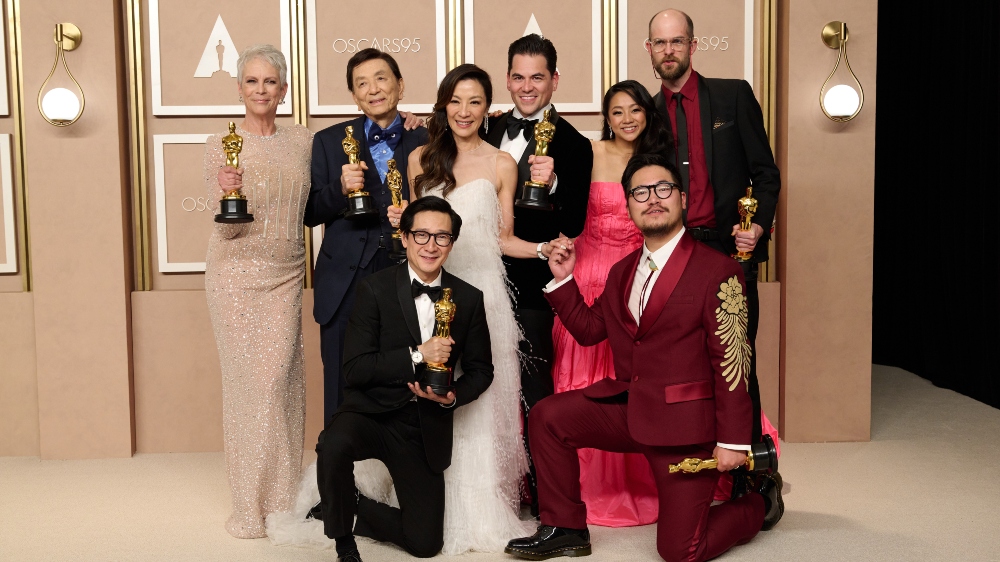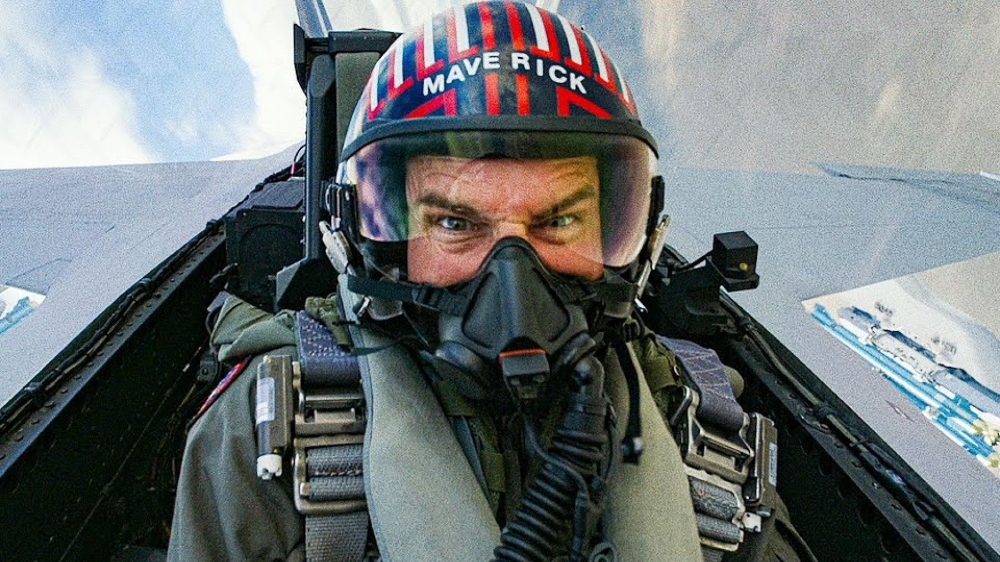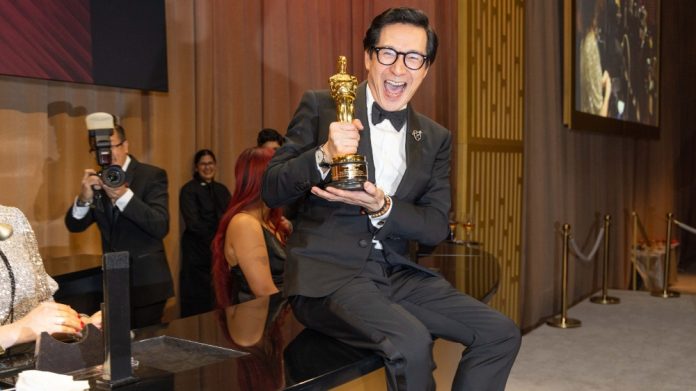I was glad that Everything Everywhere All at Once won the Oscar for Best Picture. I mentioned two weeks ago that I was doubtful that the Academy would come through on this, but that I would be pleasantly surprised if it did. Lo and behold, just as it had three years ago with Parasite, the Academy cleared the low bar I set for it.
So understand that what I’m about to discuss is not some misplaced bitterness about an undeserving movie taking the top prize. Last year’s Best Picture winner, CODA, also deserved to win, even if the competition was kind of weak. Same thing this year. EEAAO was the right winner. If I’d had an Oscar ballot, I’d have ranked it second after Top Gun: Maverick, but since that movie had no chance to win, I was pleased to see Daniels‘ impressive work properly recognized.
In another year, with better movies, I don’t think it wins, and maybe it doesn’t even come close, and that’s sort of what I’m going to talk about today — the fact that we have now had two years in a row in which the best film is perfectly fine, but not necessarily anything more than that. It’s not even an egregious injustice — like when Crash beat Brokeback Mountain, or The English Patient beat Fargo — because there weren’t other movies that were good enough to compete. We’ve just had two years in a row of really, decidedly mediocre movies.
How mediocre? Think of this: there are eight above-the-line categories for the Oscars, and any one film can win a maximum of seven of them, since two are writing categories, and a single film can only be eligible for one. The previous record for most above-the-line wins by any single film was five, held by several movies, including It Happened One Night, One Flew Over the Cuckoo’s Nest, and The Silence of the Lambs. Well, EEAAO broke that record the other night, with six above-the-line wins.

For the record, I think each of those wins was deserved, and I am thrilled that Michelle Yeoh, Jamie Lee Curtis, Ke Huy Quan, Daniel Kwan, and Daniel Scheinert all took home the gold. But seriously? This is the movie that now holds the record? Again, good movie. Maybe even a very good one, but the most recognized in above-the-line categories in Oscar history? That’s sort of crazy.
Two years in a row of this makes me wonder if this is a blip that might have something to do with the years we lost to the pandemic, or if we have a serious movie drought on our hands.
Now, the list of filmmakers, many of them Oscar darlings, who have movies coming out this year is rather impressive. It includes Bradley Cooper, Alexander Payne, Martin Scorsese, Luca Guadagnino, Christopher Nolan, Todd Haynes, Michael Mann, Emerald Fennell, Taika Waititi, Ridley Scott, Steve McQueen, Sofia Coppola, Yorgos Lanthimos, Greta Gerwig, and my personal favorite, David Fincher. In the immortal words of Larry David, that’s a pretty, pretty, pretty good list, even if some of these directors haven’t made a great film in a while, or are overrated, or are more than a bit past their prime (I’ll leave it to you to decide which filmmaker falls into which category). Add to the list the indie films and sleepers we’re not yet aware of — like, say, Everything Everywhere All at Once, which would have been no one’s idea of an Oscar frontrunner when it was released around this time last year — and our hopes can grow even higher.
But even with all this in mind, to believe that each and every one of them is going to come out with a brilliant movie is wishful thinking. Even if they all do, we’re not getting a roster like this every year. On the contrary, I think this coming year is an outlier, one that we won’t see again any time soon.
Part of that is because the studios aren’t putting out original movies anymore, and more and more filmmakers are turning back to independent film or streaming services to tell their stories. Doubt it? Look at the upcoming release schedules for either Disney or Warner Bros. Not including animated films, Disney has two original films coming out this year not based on a franchise or IP, and Warner has none. Sony has a few, at least, as does Universal, but the trend is continuing in the wrong direction.
It used to be that the studios would take chances and make the kinds of movies that made us fall in love with movies in the first place, but that hasn’t been the case in a long time. Two of my nephews love to act and be on stage and are very involved in theater, and they couldn’t care less about movies. My brother — their dad — tries showing them the classic films that thrilled us when we were their age but they’re indifferent. On the one hand, we could blame that on TikTok culture and a shrinking attention span, but I don’t really buy that, because they do go to movies now and again and do enjoy them, they just don’t treat them with any kind of reverence. I think it’s because the movies they see tend to be of the lowest common denominator variety, because that’s what the studios continue to give them. And, by extension, us.
A24 just won seven of the eight above-the-line Oscars, with Brendan Fraser‘s Best Actor win adding to the six taken by EEAAO (Sarah Polley‘s Adapted Screenplay win goes in the MGM column, which means Amazon). That should be a real wake-up call for the studios, but they only won two last year, one the year before, and two the year before that, which tells me they don’t really care all that much anymore.
Or do they? Universal just signed the Daniels to a long-term deal to make movies for the studio. Will the pair continue to make their weird, outside-the-box movies like EEAAO and their first film, the extremely weird and extremely watchable Swiss Army Man? Or will they follow the lead of, say, James Wan, who makes edgy and entertaining films when he’s painting on a smaller canvas, but when he’s given nine-figure budgets, tends to falter? Or Chloé Zhao, who made three terrific movies in Songs My Brothers Taught Me, The Rider, and Nomadland before stumbling with her first studio film, the crushingly dull Eternals?
To be fair, there are very few indie filmmakers who remain indie filmmakers for the entirety of their careers. For every Jim Jarmusch or Kelly Reichardt, there are a lot more like Nolan, Waititi, Payne, or even Scorsese, who make a small film or three, get some attention, and then turn that into a thriving studio career. The trick is whether or not they can continue their magic when given more money and allowed to tell bigger stories. Some can adapt well and stick around and others can’t — I’m infamously not a Nolan fan, but acknowledge that he always takes big swings — so they either fade away or return to the smaller films they made their bones with in the first place.
Also, for every indie filmmaker who goes big time, there is a line of others ready to take their place, telling new and innovative stories. That part of this is great because the film industry certainly does its part to reinvigorate itself.

But at the same time, the bigger stories? The ones that we used to love and which used to regularly compete for the most prestigious prizes? They aren’t being considered for awards because, well, they’re not being made. On the one hand, I appreciate that smaller and more esoteric films like EEAAO or Nomadland or, going back a bit, Moonlight, can take the big prize. On the other, I think it’s relevant when someone as estimable as Steven Spielberg says that Top Gun: Maverick saved the film business by being a big, sprawling, epic audience grabber that also happened to be, by the way, a really, really good movie.
Yes, I know it’s a sequel, and therefore doesn’t qualify as an original piece of work, but it is such a fresh take on an older concept, and so artfully done, the point is still valid.
Making any movie, even a bad one, is hard. I know this from experience. But the studios used to be a lot better at making good ones. I recognize that, by bringing in more inventive filmmakers like the Daniels, they’re at least making an effort to do that. However, for the movie business to not just survive, but actually thrive well into the future, something like Maverick shouldn’t be such an anomaly among blockbusters.
The way things are going, though, I’m becoming increasingly dubious of that possibility.
 Neil Turitz is a journalist, essayist, author, and filmmaker who has worked in and written about Hollywood for more than 25 years, though he has never lived there. These days, he splits his time between New York City and the Berkshires. He’s not on Twitter, but you can find him on Instagram @6wordreviews.
Neil Turitz is a journalist, essayist, author, and filmmaker who has worked in and written about Hollywood for more than 25 years, though he has never lived there. These days, he splits his time between New York City and the Berkshires. He’s not on Twitter, but you can find him on Instagram @6wordreviews.
You can read a new installation of The Accidental Turitz every Wednesday, and all previous columns can be found here.



